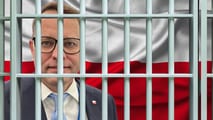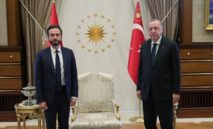Council Of Europe Takes Up Abortion Debate
By Ahto Lobjakas - Radio Free Europe / Radio Liberty
BRUSSELS -- There was little to suggest controversy in the title given to the draft resolution by the Parliamentary Assembly of the Council of Europe (PACE): "Women's Access to Lawful Medical Care: The Problem of Unregulated Use of Conscientious Objection."
But the debate quickly honed in on one issue -- abortion. The sensitivity of that issue in turn ensured the intense involvement of various vested political, ethical, and religious interests.
The debate that followed -- both within PACE and outside -- produced an irreconcilable conflict. Exponents of two varieties of right -- understood as a legal entitlement to state protection -- clashed over whether ultimate precedence should be given to expectant women or their unborn children. To use controversially loaded terminology from U.S. political debate, the issue boiled down to "choice" versus "life."
The original draft was submitted by a cross-party group of national deputies in the parliamentary arm of Europe's foremost rights watchdog seeking an affirmation that no medical practitioner could refuse to perform a legally permitted medical procedure -- such as abortion or euthanasia -- on grounds of conscience.
After a heated debate and 29 amendments, the resolution adopted on October 7 stated that no "hospital, institution, or person may be subject to pressures, or be held liable or suffer discrimination of any kind for refusing to perform, allow or assist an abortion..." or any other contested procedure.
The original sponsor of the draft, former British Member of Parliament Christine McCafferty, ended up voting against the declaration as it was adopted.
Framing The Debate
Gregor Puppinck, with the European Center for Law and Justice, campaigned for "life." He says he welcomes the new PACE resolution, as it sanctifies key human values.
"Those three values -- freedom, conscience, and life -- they are really at the [root] of all democracy, Western democracies, of the Council of Europe," Puppinck says. "And so, we were not [fighting] against abortion or against euthanasia. We were fighting to protect the right of the doctors, of the medical practitioners, of [medical] institutions to provide, or not -- if they don't want to, to be free to not provide -- to be free to not practice euthanasia or abortion."
Ingrida Circene, a Latvian deputy and chairwoman of the PACE Committee on Equal Opportunities for Women and Men, was a vocal backer of the original draft resolution with its emphasis on denying doctors the right to object to performing abortions or other procedures they object to.
In giving her committee's backing to the McCafferty report, Circene argued that those medics unwilling to perform certain tasks should avoid seeking employment in areas like gynecology. In her statement she drew a parallel with professional armies: "Would it be conceivable for a professional soldier to invoke conscientious objection so as to avoid participating in military operations?"
Circene says that for her, the key issue is whether a given procedure is legal or not. "We are talking about a legal procedure, legal measures, [all] legal, legal," she says. "I'm putting the stress on [the legality] of the procedure. Because if I want to receive from the state a legal procedure -- it's unbelievable that we can make such laws or recommendations or resolutions against the laws of the state."
Mostly Legal
Abortion is legal in most European countries. Of the 27 EU member states, only Malta prohibits it. Most countries allow unwanted pregnancies to be terminated until the 28th week, with an emphasis on the well-being of the prospective mother.
The campaign against limits on conscientious objection was led by Senator Luca Volonte of Italy, also the chairman of the European People's Party (EPP) at PACE, and Senator Ronan Mullen of Ireland.
Circene, herself a member of the right-wing EPP group, noted that "not a single woman" spoke out against the original version of the draft. The Latvian deputy said Volonte had prevented an internal EPP debate on the issue because it would have gone against him.
The hijacked declaration fell short of the two-thirds majority necessary to turn it into a recommendation for Council of Europe member states.
There is, however, a glimmer of a common ground between the positions of people like Puppinck and Circene -- if not all participants of the dispute. In a statement published on his organization's website before the vote, Puppinck rued the fact that with the original draft "abortion becomes the rule, conscience the exception, whereas, even after its decriminalization [in most of Europe], abortion has always been considered as an exception, never a right or a good per se."
Circene says she, too, opposes impulsive pregnancies. She says the backers of the original motion are in favor of better educating parents in matters of family planning in order to avoid unwanted pregnancies.
But, she notes, the antiabortion lobby is predominantly religious. More specifically, it tends to be Catholic. The Catholic Church, in turn, remains opposed to the use of contraception.
This turns the issue for Circene into a broader women's rights problem. Men, she says, tend to excuse themselves of involvement in issues to do with reproduction, leaving women to deal with the consequences. This means, she says, that women must have an unquestioned right to decide on whether to go through with pregnancy.
"If we're looking today, in the 21st century, we have to plan our lives," Circene says. "If women will deliver all pregnancies, they're out of careers, out of jobs."
Curious Alliances
That Catholic groups take a keen interest in the issue appears undeniable from even the most cursory glance at reactions published on the Internet.
Puppinck confirms this, saying a predominantly religious alliance stands behind the campaign for doctors' rights to conscientious objection.
"Now there are more and more members of parliament and politicians who start to speak against this agenda," he says. "So we see -- very interesting[ly] -- we see a kind of alliance between some western, mainly, I would say, Catholic members of parliament and eastern, Orthodox members of parliament who agree to fight for what we could [call] a moral approach or a Christian approach [to] moral issues."
But there is increasingly another side to this controversy in the shape of the various Muslim organizations that have sprung up across Europe as the numbers of immigrants following Islam has swelled in recent decades.
Gregor Puppinck notes that the rise of Islam has led to a paradox in contemporary Europe in the emergence of a reaction in the form of muscular secularism that rejects the impositions on private life of all religion -- lumping together Muslims and conservative Christians.
"So, the problem we have now is that fighting against Islamic extremism, politicians -- because they cannot officially [make] any distinctions between the Christian and Islamic religions in terms of value -- they will also fight back against the Christians," he says. "So, to some extent, a more radical secularism is more and more prevailing in Europe in order to fight all religions. But the real problem is the Islamist -- or extreme Islamist -- cultural ambition [of imposition on] Europe, than, of course, our Christian tradition and roots."
Puppinck is keen to emphasize that the debate at PACE is largely a symbolic one for Christians. In practical terms, it is unlikely to have much impact on modern Europe or its views or mores. The objective, he says, is not to create obstacles to the availability of abortion, but simply highlight it as a moral issue that continues to resonate with many Europeans.








